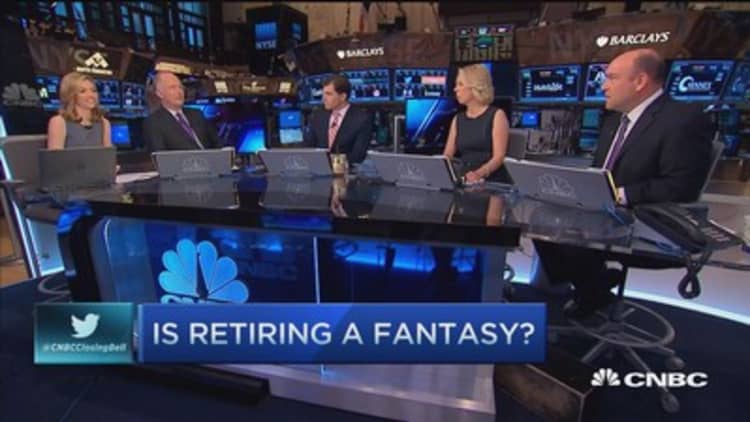
Human life has reached an inflection point—one that matters a great deal for those planning for retirement.
One hundred years ago, the average lifespan was about 42. That's now doubled. People are living longer and trying to stretch their income to make ends meet and stay ahead of inflation, but that's not the inflection point financial advisors are really concerned about—that's just the everyday blocking and tackling on behalf of client portfolios. The emerging challenge goes way beyond that.
Scientists have found the mechanisms that govern aging and are already doing experiments in rats on how to reverse it. They've found species that do not die of old age, such as the jellyfish Turritopsis.
"We're adding three months to life per calendar year," said Salim Ismail, former innovation director at Yahoo and founding executive chairman of Singularity University. "It's not an if, it's a when, and the point in time is in the 15- to 20-year range," said Ismail, speaking at the Exponential Finance conference in New York City on Wednesday.
"In a decade or two, or three, there will be a class of people taking treatments who can live for a long time, and that affects employment planning, retirement planning ... Society will never have seen that before," Ismail said.
The first person to reach age 150 has already been born. How do I talk to a client preparing to retire at 65 using the traditional model and with planning software that only goes to age 95? The financial model is broken.Ric Edelmanchairman and CEO Edelman Financial Services
When it comes to the rise of technology, financial advisors have been challanged by the robo-advisors, and the financial media has latched on to the trend of online investment management as an existential crisis for the advisory business. Advisors contend that the robo-advisors haven't been tested in a down market—they all launched after the financial crisis. And they can't do the hand-holding that an advisor—part therapist, part life counselor—can.
But for advisors such as Ric Edelman, chairman and CEO of Edelman Financial Services—which has 27,000 clients and 41 offices in the U.S. and launched its own robo-advisor two years ago—the really critical technology challenge for financial advisors and their clients is exponential health care.
Read MoreAre retail bank branches doomed?
"The first person to reach age 150 has already been born," Edelman said during an Exponential Finance panel discussion on the future of the advisory business. "How do I talk to a client preparing to retire at 65 using the traditional model and with planning software that only goes to age 95? The financial model is broken."
Crazy talk
Edelman said the shift from a linear to a cyclical lifeline is already starting to be seen: The average American at age 35 has already had eight jobs. "It's not going to be birth, school, job, retirement, death," he said. Soon individuals will cycle between work, school, sabbaticals, more schooling and more work in a cycle that has never before existed.
"It's going to be less about money in the future and more about the future," said Bill Bachrach, chairman and CEO of financial advisory consultant Bachrach & Associates. "How do you sit down with someone in their 30s or 40s and tell them that they are going to live to 110 or 120 and haven't prepared financially for that?"
Bachrach said that at first the challenge won't be that the information is overwhelming; it's that the client won't even believe what the advisor is saying, making it the most difficult and potentially costly conversation an advisor needs to initiate. "They will look at you like you are smoking crack," he said. "It's the singularity conversation, and if they think an advisor is crazy, then the advisor will lose the client."
A 401(k) for a 1,000-year-old baby
The push and pull between financial advisors and financial technology, meanwhile, is nothing new for those who have been in the business for a long time.
"We've been dealing with it for decades with financial-planning software," Bachrach said. "You don't see us using a slide rule and yellow pad anymore."
Edelman said the day when his firm delivers a tablet preloaded with financial-planning tools to a client by FedEx ahead of a video conference—rather than rely on its expensive and time-consuming network of 41 nationwide offices—is coming. Avatars will also be used to deliver financial counseling.
"It's all those things we have to move more toward," he said.
Read MoreTrust a robot with your money at 64?
Ultimately, Bachrach said, consumers will start going to advisors and saying, "I've heard about the 'singularity,' and I may have another 40 years when I thought I would have a lot of money and then transfer that wealth to my kids. But if I live another 40 to 50 years, how do I do that?"
Advisors may be able to help baby boomers massage the immediate issue, which Bachrach summed up as "boomers screwing Gen X and Gen Y again. ... 'We first destroyed the planet, and now we're stealing your inheritance.'"
But no advisor or software today has the solution for the question of immortality. "It's back to human skills," he said. "I'm not sure how robo-advisors do that, but maybe they get better and better."
Time is on the side of financial advisors in practicing their approach to this question.
"Forget the person who lives to 150; it's the baby living to 1,000," said Ismail of Singularity University.





